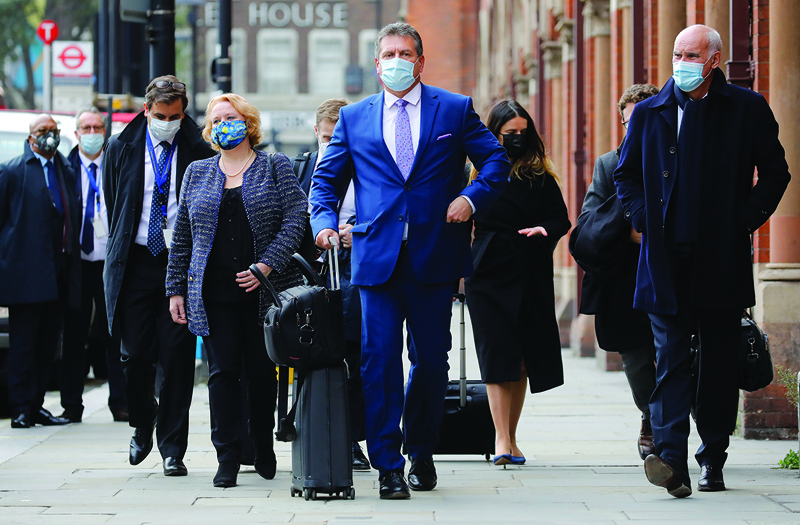
LONDON: Britain and the European Union held fresh meetings yesterday to try to unlock their Brexit impasse after London threatened to walk out and go its own way next year despite warnings of further damage to the COVID-hit economy. The UK government launched an information campaign advising businesses that "time is running out" to be ready for a complex new trading chapter with a post-Brexit transition period expiring at the end of this year, deal or no deal. But industry groups continue to warn of potential chaos for road hauliers and the possibility of drugs shortages, as vital preparations remain in the early stages ahead of Britain unwinding nearly five decades of European integration.
Confederation of British Industry (CBI) deputy chief Josh Hardie said a "hat-trick of unprecedented challenges" loomed amid the first wave of coronavirus earlier this year, its resurgence now and "uncertainty over the UK's trading relationship with the EU". Senior minister Michael Gove said Sunday the door remained "ajar" for an overarching trade deal to remove much of the uncertainty if the EU shifts position, despite Prime Minister Boris Johnson declaring last week he was ready to abandon talks.
Gove met European Commission vice president Maros Sefcovic in London yesterday morning to discuss the two sides' existing divorce treaty, which Britain has threatened to redraw through a new internal market bill to regulate post-Brexit trade within the UK. The contentious law has passed Britain's House of Commons and was due later to come up for debate in the upper chamber, the House of Lords, which includes Anglican bishops. In a rare joint letter published in the Financial Times, the five most senior bishops including Archbishop of Canterbury Justin Welby said the bill set a "disastrous precedent" for violating the rule of law.
'Focus minds'
Yesterday, UK chief negotiator David Frost and EU counterpart Michel Barnier were to discuss the structure of their troubled negotiations by videoconference in light of Johnson's threat, which scuppered a planned visit to London this week by Barnier. The two sides disagree on state subsidies, how rules on fair competition will be policed and how much access EU fishing fleets will get to UK waters.
Failure to strike a deal would see Britain and Europe revert to World Trade Organization terms, with tariffs and quotas for businesses, potentially devastating for economies already weakened by the pandemic. "Make no mistake, there are changes coming in just 75 days and time is running out for businesses to act," Gove said in launching the new campaign.
"It is on all of us to put in the work now so that we can embrace the new opportunities available to an independent trading nation with control of its own borders, territorial waters and laws." British business groups say they are doing all they can to prepare but are hampered by a lack of government clarity, including about a new IT system for EU-bound truck drivers that is still in the testing stage.
The Association of the British Pharmaceutical Industry urged the government to agree a sector-specific agreement with the EU to ensure an uninterrupted flow of lifesaving drugs, if a comprehensive trade deal cannot be reached in time. "Our members are preparing for the end of the transition period at the same time as coronavirus cases rise across Europe," ABPI chief executive Richard Torbett said. "This should be enough to focus minds." - AFP

![European Commission vice president Maros Sefcovic (C) wearing a face mask or covering due to the COVID-19 pandemic, prepares to enter London St Pancras station in London on October 19, 2020. - Britain still wants to reach a post-Brexit trade deal with the European Union despite the current deadlock, a senior government minister insisted ahead of fresh talks Monday. The UK had imposed a deadline of last week's EU summit for a deal, and Prime Minister Boris Johnson said he was ready to walk away and prepare for a no-deal exit after five decades of EU membership. (Photo by Tolga AKMEN / AFP) / ìThe erroneous mention[s] appearing in the metadata of this photo by Tolga AKMEN has been modified in AFP systems in the following manner: [prepares to enter London St Pancras station in London on October 19, 2020.] instead of [after arriving in London]. Please immediately remove the erroneous mention[s] from all your online services and delete it (them) from your servers. If you have been authorized by AFP to distribute it (them) to third parties, please ensure that the same actions are carried out by them. Failure to promptly comply with these instructions will entail liability on your part for any continued or post notification usage. Therefore we thank you very much for all your attention and prompt action. We are sorry for the inconvenience this notification may cause and remain at your disposal for any further information you may require.î](/theme_kuwaittimes/images/no-image.png)